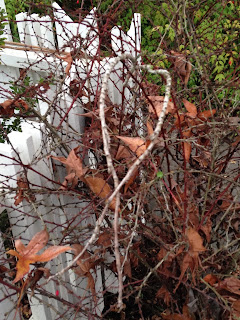Yesterday, I saw John and Sara. I am delighted to see John's happiness continuing to grow. Sara, his wife, is shy, but I think she, too, is settling in. I still wonder if they belong in a home dedicated to dementia, but they seem to be the sort of couple who, even if they had to live on a rock, they would be content as long as they had one another.
Lynn joined us in her usual flurry. She needs no wheelchair. She is exuberant and loving, and always greets us with a hug and a smile. Her words are quite garbled, but that does not deter her zeal. I can usually pick out a word or two and use them to enter the conversation. However, yesterday as she enthusiastically greeted me, I could not decipher a single word. Fortunately, her hair caught my attention. It is a thick and striking mixture of black, grey, and white. It is somewhat tamed by a poor haircut, but in keeping with her personality, her hair does not simply grow, it springs from her head. I told her her hair was beautiful. Her response was a large smile and a clearly spoken thank you. She then sat down to listen.
As I was beginning to say my good-byes, John told me that he and Sara pray every day for the caregivers, their families, and the residents. I sense their quiet devotion is an oasis for many, even if they are not completely aware of it, and I thanked them and said I would add my prayers to theirs. Lynn held out both hands, and I placed mine in hers. In the tumbling words that followed what I heard was, "It is good that we are here." I responded that yes, it was very good indeed. In that whirlwind, I sensed God's calm reassurance that at all is in good order.
Today is the last day of February and tomorrow is Ash Wednesday. As we prepare to begin our Lenten journey, this year it seems important to remember that an aspect of this journey is alms giving - as we simplify our lives, we hopefully can share more with others. Unfortunately, when there is a decree from the top that there must be "belt tightening," it seldom bodes well for those whose belts are already on the last notch and wearing thin. Yet, this morning I again hear the reminder that being with one another is good, and I am encouraged. I leave you with a blessing from Blessings of the Daily.
May love be the gardener of your years bringing forth from you your grounding in God, a harvest of wholeness and peace, a bounty of courage and compassion. May your soul tower with the strength of the cedars, your heart pound with the power of the sea. May joy rise in you like the mountains and may it be the blessing you share with all those you love who this day make merry that in you the great love of God has found a home on earth. Amen.














